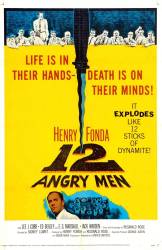Question: Am I correct that when Henry Fonda is questioning the E.G. Marshall character about his recent activities Marshall says that the night before he worked until 8:30 then went home? The trial was every day for the past several days.
Question: Were all-male jury panels the norm in the 1950s?
Answer: Depends where, and the type of case. At the time the film was made, women were still barred from juries in three states (South Carolina, Mississippi, and Alabama); it wasn't until 1994 that the Supreme Court ruled that lawyers could not strike women from juries solely on the basis of gender. SCOTUS had ruled in 1942 that all-male juries were constitutionally acceptable. New York State (where the story is set) had granted women the right to serve on juries in 1927, so an all-male jury may not have been the norm across the board, but the nature of the crime (murder) would have, at the time, allowed lawyers to exclude women at the jury selection stage by citing the unsavoury aspects of the crime and arguing that the details of the case were not "suitable" for women to hear (being such delicate creatures, you understand /s).
Question: Did they ever look at the hole in his pocket that the knife supposedly slipped out of?
Answer: If you're referring to the jurors, no. We see the entirety of their deliberations. If you're referring to the prosecution or defense, that is unknown. Given, however, that none of the jurors brought up the question, it's likely there was at least a check of his clothes to verify he had a hole in his pocket.
Given how easy it would be to simply tear a hole as an excuse, even if it was there, it wouldn't be much in the way of corroboration.






Answer: He was actually talking about the night before the last one. Trials, especially longer ones for serious crimes such as murder, are not usually on consecutive days...often there is a recess after the prosecution rests, and another after the defense, before closing arguments and the jury's deliberation. During those recesses, unless they are sequestered, the jury members would return to their normal lives (including work), and report back to the court when summoned.